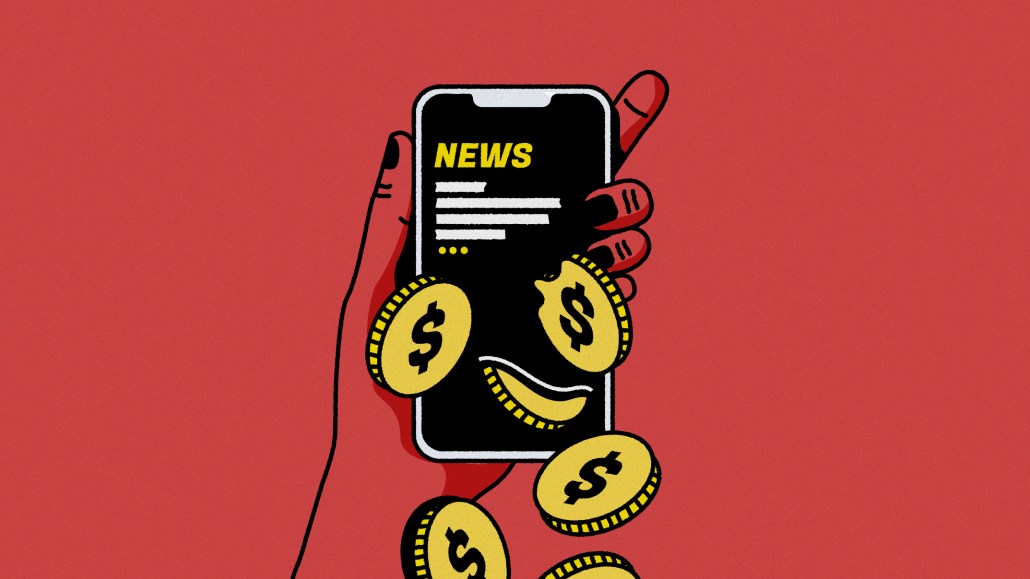Secure your place at the Digiday Publishing Summit in Vail, March 23-25
‘Assigning value to every action’: Why Decrypt created its own cryptocurrency for super readers

The correlation of being a reader who becomes a consumer is well proven. Like a beauty publisher might license its own lipstick line, a publisher covering blockchain might come out with its own cryptocurrency.
That logical progression of capitalizing on a reader’s interest is exactly the strategy Decrypt, a three-year-old publisher covering cryptocurrency, is launching this year.
Decrypt is incentivizing its users to read and interact with its content in exchange for the publication’s unique take on cryptocurrency: its utility token (DCPT).
The publisher is also capitalizing on readers’ affinity for games by turning engagement into a rewarded action. Users of the site’s app, which launched nine months ago, can create an in-app wallet and earn tokens for taking actions on articles like reading (three tokens), reacting with an emoji (one token), or sharing (two tokens).
The tokens are closed within the publication’s environment and are not publicly tradable like security-backed cryptocurrencies, but they are exchangeable for items of value provided by Decrypt and site sponsors. These items include T-shirts, stickers, access to promotional events or premium content.
The token, which has been in beta for six months, is serving as an engagement tactic, similar to a rewards program. Currently, there are 51,000 people on the waitlist for DCPT, all of which joined organically by word of mouth, according to Decrypt’s new publisher and CRO Alanna Roazzi-Laforet, who joined from blockchain software company ConsenSys.
The publisher expects DCPT to help grow its audience. In 2020, the publication’s traffic increased by 350% in February 2021, Decrypt had more than 4.5 million unique visitors to the site, said Josh Quittner, CEO and founder of Decrypt.
“Decrypt really wants to use the products that we speak about in the market,” said Roazzi-Laforet.
“This is an example of eating your own dog food,” said Jacob Donnelly, who formerly managing director at crypto publication CoinDesk. He now runs a paid newsletter about building digital media companies called, A Media Operator, as well as serves as the general manager of B2B at Morning Brew.
Rewards systems for loyal readers are not a new strategy for engagement, but Decrypt’s token offering is a unique take on that model because of how endemic it is to its coverage, Donnelly said. “They write about crypto, they write about blockchain. So having a wallet and a token baked in is interesting,” he said.
Donnelly equated this to Bustle Digital Group’s brand Inverse that has a newsletter incentive program, which enters subscribers into a drawing for a prize if they open newsletters regularly. Only Decrypt is taking it a step further by guaranteeing rewards once enough value is accrued.
“Inadvertently, they are assigning value to every action on their platform. That’s very hard to do that — if you talk to 99% of media companies, they still can’t tell you the [lifetime value] of a reader,” Donnelly said. “This is a very interesting exercise” but it works in a closed ecosystem.
Building a cryptocurrency is not just an engagement tactic, but part of the publisher’s advertising strategy.
Roazzi-Laforet said brands are able to sponsor each so-called season of the token, which is the period of time that 1 million tokens are released and then subsequently collected by users. The tokens are first-come, first-earned and the sponsors also contribute the rewards that the tokens are later exchanged for by the app users.
“One of the big reasons we’re doing it is to get out from under the thumb of Google and Facebook, which are taking so much of the advertising dollars and forcing everybody to sort of march to their beat,” said Quittner. “We can be much more responsive to the kinds of advertisers that we want to affiliate with and get them the kinds of users and potential customers that they’re looking for in a way that’s really ethical and doesn’t compromise our users’ identity.”
Decrypt would not disclose how much these sponsorships cost, but Roazzi-Laforet did add that they can be wrapped into a larger sponsored content campaigns that include digital advertising or creating digital assets known as non-fungible tokens (NFTs). She would not disclose who the sponsors have been, but said they consist of both endemic brands and ones that want to reinvent themselves for 2021.
Decrypt launched in spring 2018 at a time when Bitcoin had lost more than $10,000 worth of its value.
“It was a great time to launch. Crypto markets are volatile. When we’re in a big bull market, we have a huge amount of readership. Similarly, when there’s a big pop of a bubble, people are reading because they’re really worried they want to know what’s going on,” said Quittner.
While there are thousands of different cryptocurrencies, Quittner added that changes to the value of the top 10 most valuable currencies drive the most spikes in traffic. When Bitcoin doubled from $30,000 per coin at the end of January to nearly $60,000 in February, traffic spiked along with it.
“Ultimately what [Decrypt] is trying to do is create a habit with a reader,” said Donnelly. “And if you can incentivize that habit in some way, then the incentive ends up being far cheaper than the value of that engaged reader — coupled with the fact that Decrypt is actually making money because they have sponsors.”
More in Media

Why more brands are rethinking influencer marketing with gamified micro-creator programs
Brands like Urban Outfitters and American Eagle are embracing a new, micro-creator-focused approach to influencer marketing. Why now?

WTF is pay per ‘demonstrated’ value in AI content licensing?
Publishers and tech companies are developing a “pay by demonstrated value” model in AI content licensing that ties compensation to usage.

The case for and against publisher content marketplaces
The debate isn’t whether publishers want marketplaces. It’s whether the economics support them.








